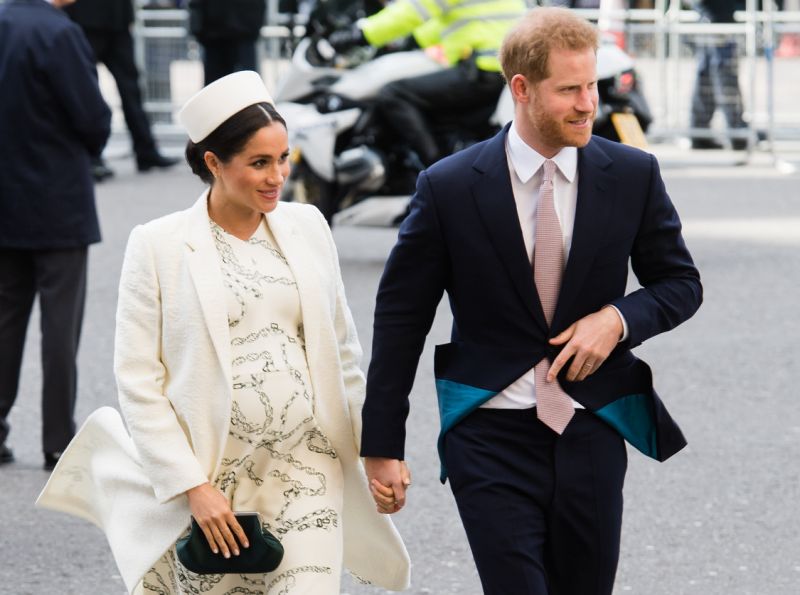It’s the stuff romcoms are made of: beautiful young woman meets charming prince and, after a series of mild miscommunications, they live happily ever after. Well, that’s how it’s supposed to go at least. Meghan Markle, the much put upon protagonist of this Nora Ephron-meets-Get Out fairytale, has gone off-script and attempted to create a different happy ending, and with good reason.
Everything that could have predicted the pair’s joint decision to step back as senior royals can be directly traced back through all the sensationalist and derogatory headlines written about Markle. She couldn’t even enjoy avocados without being framed as a drought- and murder-fuelling traitor, set on bringing down the monarchy. Harry, to his credit, has been by her side every step of the way, challenging traditions by demanding an end to the tabloids’ abuse of her, which sadly had little impact. If anything, it gave the news cycle more to talk about – but his actions were nonetheless commendable.
Harry has never been comfortable with his position as royalty, and as the burden of one day becoming king was on his older brother, he was given the opportunity to be more open about his world. The death of Princess Diana was something her children never truly recovered from. Growing up, Harry definitely committed his fair share of disturbing faux pas, but this week it has been hard not to root for him as a husband and father trying to protect his family from falling victim to the trauma of his own childhood.
When Markle stepped out of Hollywood and into the royal family, press coverage was awash with weak platitudes of progression: we were fed the idea that her move into the institution was a sign of “modern times”, and that having a mixed-race woman in the royal family was a milestone in British history. Their wedding, just a year and a half ago, featured preacher Michael Curry and a black gospel choir; the media described it as a “modern, diverse wedding for a modern, diverse couple” – one that was “nudging the British royal family into a new era”. News outlets speculated on everything from whether the wedding would end prejudice against mixed-race relationships, to whether it would boost business for black female entrepreneurs. But it didn’t take long for the tabloid onslaught, or for Markle’s mere existence to become a tokenistic rhetorical device for those who claimed our country didn’t have a problem with race. How could we possibly be racist if we have a black princess?
As a successful, mixed-race woman from California, Markle became the media’s new punchbag, and her family weren’t spared media intrusions either. The contrast in treatment towards each of her divorced parents, however, was glaring: dog-whistles for her black mother, and sympathy for her white father. In her time in the public eye, Markle’s mother Doria Ragland has been a picture of dignity, yet was still the constant victim of coded racism, in the form of inaccurate references to slavery and gang violence. Meghan’s father, Thomas Markle, was gifted a little more empathy by the tabloids, often portrayed as a lovable rogue disowned by his “heartless” daughter, even though he repeatedly betrayed and embarrassed her on the international stage. All the while, this racist and sensationalist reporting stoked tensions on social media, and bigots and trolls felt vindicated in their racism.
Reflecting on the unfortunate series of events that have unfolded around Markle, there is much we can learn about the current state of racism in this country.
Critics have argued that Markle knew what she was signing up for, and should have been more prepared. But the onus should not be on people of colour to swallow racism – an assertion rooted in victim-blaming culture: where the minority on the receiving end of abuse is supposed to rise above everything in order to maintain decorum, while the abusers are free to spew whatever they wish. After seeing what they had to say, I can’t help but wonder if Markle, a former successful actor who was largely palatable to an overwhelmingly white media, can be harassed into stepping away from the crown, then how might the public react to someone with less privilege than her?
It seems that much of Britain desperately wants to be absolved its racist history without doing any work to combat racism – treating marginalisation and discrimination like imagined annoyances not worth confronting. But looking at the fate of a royal couple that was supposed to symbolise progression and a supposedly “post-racial” British society, it seems clear that there is still much work to be done.
-Guardian




